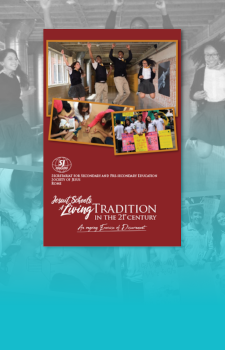Other Important Documents
- During the first cycle of global gatherings two documents have been produced that have become an important resource for discernment:
1. Jesuit Education Aims to Human Excellence:
Men and Women of Conscience, Competence, Compassion and Commitment (2015). This document summarizes the discussions and discernment that happened during SIPEI (International Seminar on Ignatian Pedagogy and Spirituality) in Manresa, Spain in 2014. The document uses the 4Cs (conscience, competence, compassion and commitment) to identify the core elements that define the education of the whole person within the Jesuit Education tradition today.- See section 9 of the Part III of this document: Jesuit schools are committed to Human Excellence.
2. JESEDU-Rio2017 Action Statement:
From October 15-20, 2017 in Rio de Janeiro, the Congress of Jesuit Education Delegates worked on a common global agenda for our schools with the goal to walk the talk of our network as a means to “act as a universal body with a universal mission.” (GC 35, D.2, #20) Education Delegates from the six Jesuit regions of the world along with others in Jesuit educational apostolates came together in Rio de Janeiro, convened by the Secretary for Education of the Society of Jesus. Fr. General Arturo Sosa’s address to the congress inspired the action statement that was created at the end of the congress [9].- This statement proposed thirteen actions, with eight listed as priorities, that require prompt responses from all the delegates and schools in order to become a universal body with a universal mission [10]
- The delegates committed: [11]
A. The Experience of God:
- To promoting the Examen of Consciousness in each of the
schools to help students listen to their inner voice and learn the path of interiority. - To working with the schools to ensure a module (or some such unit of the curriculum) of interreligious education is
implemented. This module should allow students to learn about and from the world ́s religions and respect the various ways religions express and celebrate the divine. - To finding ways in which Ignatian Spirituality (ref The Exercises) can be actively adapted to the school setting so that students learn the habit of stillness and the practice of discernment.
- To promoting the Examen of Consciousness in each of the
B. Tradition and Innovation:
- To engaging a process of Ignatian discernment that will lead to a plan of innovation for each school and a periodic review that corresponds to the local context and our tradition.
- To reviewing with schools the traditional organizational structures and roles with a particular regard for gender stereotypes and gender inequalities.
- To working with the schools to enhance the way parents and families are invited into our education and formation.
- To urge the schools to reflect on the nature of human holistic excellence [12] so that academic success can be understood in its proper context.
C. Caring for Our Common Home: Reconciliation with God, Humanity and Creation
- To promoting an environmental and social policy for each of our schools and to proposing ways regional networks can clearly integrate justice, faith, and care for the environment within the curricula of the schools.
- To ensuring that schools have a program in place that allows students from marginalized and poor sectors of society to participate in a quality education and to ensuring that schools serving the marginalized and poor reach beyond their experiences to build bridges with other people and communities.
D. Sent in a Global Network:
- To assessing and developing the level of regional and global networking cooperation that exists.
- To including in new faculty and staff training programs an understanding that faculty and staff are joining a global network and that they have a role to play in animating it.
- To working with the schools ́ leadership to oblige all faculty and staff be formed in global citizenship so that they can help students understand their future as global citizens.
- To making Educate Magis an integral tool and resource in the schools to help animate their global dimension.
Exercise 4. For discernment:
- Do you know these documents? What do you find particularly moving about them?
- What do you find to be inspiring?
- How is your institution, network responding to JESEDU-Rio2017 Action Statement? What actions are you executing? How?
- https://www.educatemagis.org/documents/allocution-fr-arturo-sosa-sj-jesedu-rio-congress-2017/
- https://www.educatemagis.org/jesedu-rio2017/
- https://www.educatemagis.org/documents/jesedu-rio-2017-action-statement/
- See the statement on Competence, Conscience Commitment, Compassion at https://www.educatemagis.org/documents/ignatian-pedagogy-letter-from-father-general-kolvenbach-sj/

